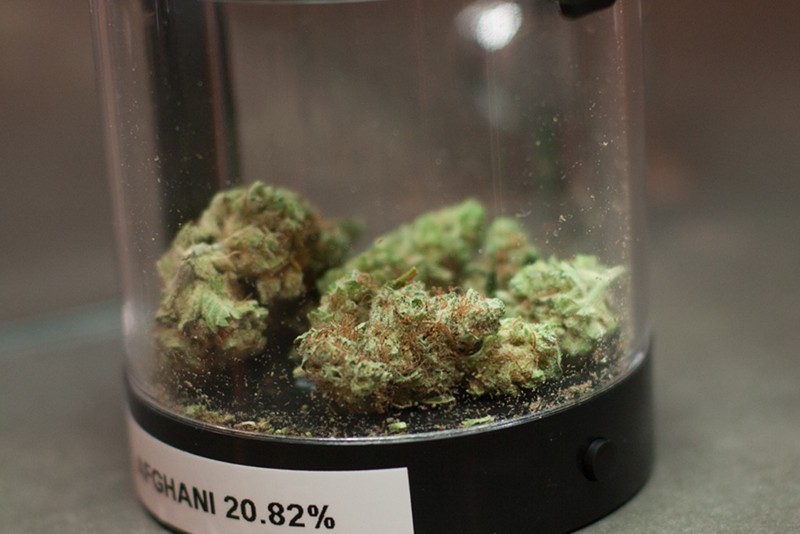Colorado marijuana regulators are strongly considering an expiration date for dispensary products in their upcoming revision of the state's rules.
Marijuana vape cartridges sold in Colorado had to include expiration dates on their products as of this year, but there are no such requirements for flower, concentrate and edibles. According to the Colorado Marijuana Enforcement Division and the Colorado Attorney General's Office, however, this has resulted in a growing number of cases involving potentially adverse health effects for consumers.
"We have a number of bad testing cases right now," Assistant Attorney General Ross Hoogerhyde told a MED rulemaking board on September 30.
Hoogerhyde leads a team in the AG's Marijuana, Liquor and Bankruptcy Unit, which provides legal and litigation advice to the MED and state Department of Revenue. He wouldn't share specific details, citing open investigations, but told the MED board that "every member of my team has more than one [marijuana] testing case, including testing cases with adverse health effects for consumers."
Based on recommendations from a science and policy committee overseen by the MED and the Colorado Department of Public Health and Environment, the expiration rules are intended to protect consumers from mold and microbial compounds that can form in marijuana or food products over extended periods of time. To support the proposal, the policy group pointed to a 2019 study from the Denver Department of Public Health and Environment showing that flower on dispensary shelves were susceptible to microbial growth after passing post-harvest contaminant testing.
The MED is proposing that marijuana product manufacturers either include a six-month expiration period on their packaging or provide research proving how long an expiration period can be for a specific product. The six-month period isn't based on scientific data, MED officials admit, but was chosen as a "backstop should the scientific process not be followed" by marijuana businesses, according to MED Deputy Director Kyle Lambert.
Marijuana business owners at the hearing argued against adding the expiration rules to the state's regulatory updates, saying that the suggestions were added too late in the process and placed more financial burdens on businesses, which would have to pay for the shelf stability of products.
"We oppose the product expiration date rule in its entirety for two reasons: a process reason, and because we don't think it's necessary. If the MED chooses to go forward with product expiration, we request that the six-month timeline be lengthened to something at a minimum of twelve months," Truman Bradley, executive director of the Marijuana Industry Group, told MED officials.
Bradley and other business owners requested that the term "expiration date" be changed to "use-by date" or "best-by date."
According to Renee Grossman, owner of Colorado dispensary chain High Q, instituting more testing would only hurt businesses that already work by the rules.
"Adding more testing requirements doesn't help public safety when people can use radon lights, microwaves or dip their buds in hydrogen peroxide to pass [contaminant] testing," she told the MED work group. "It's only going to leave people who break the rules to survive. ... It's [already] impossible to be profitable in this price environment."
The MED is expected to announce the new rules on October 11 and implement them in January 2024.
[
{
"name": "Air - MediumRectangle - Inline Content - Mobile Display Size",
"component": "12017618",
"insertPoint": "2",
"requiredCountToDisplay": "2",
"watchElement": ".fdn-content-body",
"astAdList": [
{
"adType": "rectangle",
"displayTargets": "mobile"
}
]
},{
"name": "Editor Picks",
"component": "17242653",
"insertPoint": "4",
"requiredCountToDisplay": "1",
"watchElement": ".fdn-content-body",
"astAdList": [
{
"adType": "rectangle",
"displayTargets": "desktop|tablet"
},{
"adType": "rectangle",
"displayTargets": "desktop|tablet|mobile"
}
]
},{
"name": "Inline Links",
"component": "18838239",
"insertPoint": "8th",
"startingPoint": 8,
"requiredCountToDisplay": "7",
"maxInsertions": 25
},{
"name": "Air - MediumRectangle - Combo - Inline Content",
"component": "17261320",
"insertPoint": "8th",
"startingPoint": 8,
"requiredCountToDisplay": "7",
"maxInsertions": 25,
"watchElement": ".fdn-content-body",
"astAdList": [
{
"adType": "rectangle",
"displayTargets": "desktop|tablet"
},{
"adType": "rectangle",
"displayTargets": "desktop|tablet|mobile"
}
]
},{
"name": "Inline Links",
"component": "18838239",
"insertPoint": "8th",
"startingPoint": 12,
"requiredCountToDisplay": "11",
"maxInsertions": 25
},{
"name": "Air - Leaderboard Tower - Combo - Inline Content",
"component": "17261321",
"insertPoint": "8th",
"startingPoint": 12,
"requiredCountToDisplay": "11",
"maxInsertions": 25,
"watchElement": ".fdn-content-body",
"astAdList": [
{
"adType": "leaderboardInlineContent",
"displayTargets": "desktop|tablet"
},{
"adType": "tower",
"displayTargets": "mobile"
}
]
}
]












